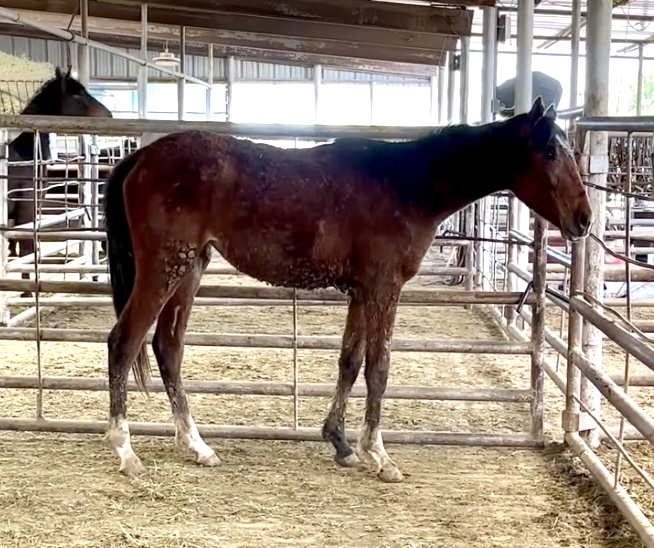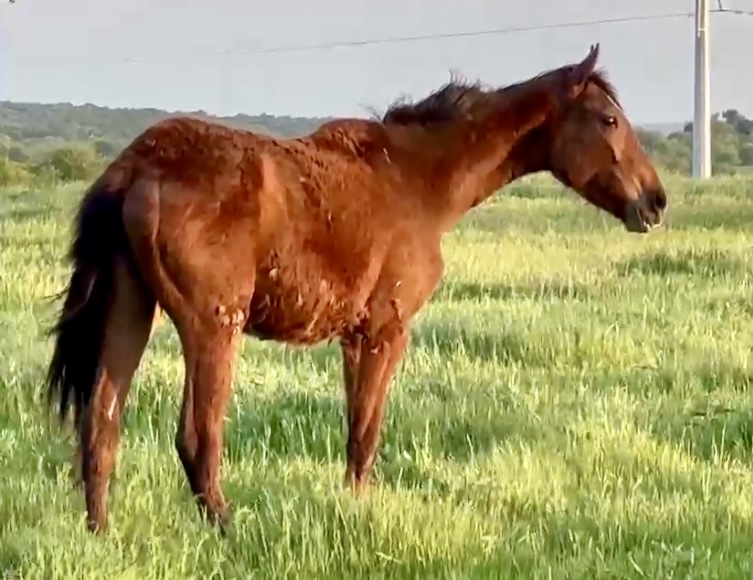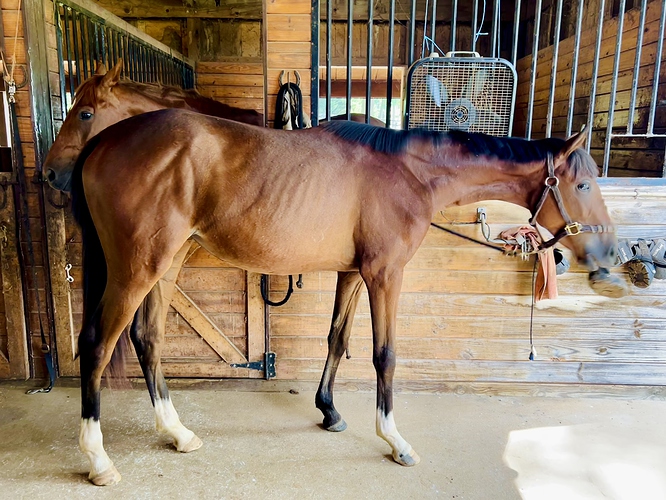More info on ‘shipping to slaughter’ that might clear up the roll of ‘kill pen’ sales …
The slaughter plants in Mexico buy loads of horses on contract from certain shippers. The contracts with particular shippers are for certain weights / loads delivered during a short date range. It is a business always on a deadline.
The plants are a producing plant business like any other, and they need the right amount of raw material supply at the right time. They don’t want more than they can handle (especially something they must feed), and they don’t want to run short, with workers and machines costing money by the hour.
The shippers have the same wants – just enough, just in time. Shippers are not randomly tossing horses on trucks. The supply of slaughter horses needs to be very certain and available at the right time.
For that reason, shipper horses in true kill pens like Kaufmans are not offered for sale to the public. They are on hold, as it were, for the next truckload. You won’t get a chance to buy a shipper horse.
Kaufman sells some and ships some. The shipper horses are not on view to the public.
Some shippers make use of true kill pens like Kaufman on I-20 east of Dallas, near I-35 to Mexico, who will buy, pen and feed hay until the shipper is ready to load and go.
Some shippers have their own pens where they will collect horses and feed hay to gain weight, until the load is ready to go by a certain time. But that is more work, buying, collecting and keeping the horses until time to ship, so a very different side to the business.
(There is a whole USDA process as well that I won’t get into.)
Mike Kaufman has his own science of selecting which horses will do best in a public sale, and which are destined for the shippers. Yes, some of Kaufman’s that don’t find a public buyer can end up in the shipper pens, unlike other horse sale businesses that don’t collect for shipment.
My understanding is that Bowie and Elkhart do not collect for shipment to slaughter. They pass unsold horses around the various sales outlets.
But, if a particular horse has not found a buyer after a few tries through various sales outlets, there is a chance that it could end up in Kaufman’s or another shipper pen. If it meets the size, weight and health criteria.
But … (another reason a horse will not go to slaughter) … not all horses are candidates for shipment to slaughter. There are legal plant criteria for slaughter horses, plus shippers want well-fleshed horses healthy for the trip. Horses must be a certain size (no ponies or foals), must be a good weight for the space they take up in the truck, can’t be significantly lame, must be reasonably healthy. Remembering that these horses are destined for food products, they can’t bring in too much contamination.
The horses that some people think would be selected for slaughter – what some people think of as the expendables, aged, infirm, lame, sick – are rarely eligible for slaughter. They don’t meet the health and/or weight criteria.
Last note – before the pandemic, a full shipper load would bring $12,000 to $15,000 on delivery to a plant in Mexico. Delivered by a deadline, and with a certain minimum usable weight after slaughter.
Another way of pointing out that shippers are very serious about their load and not anxious to sell off horses already designated for the trip.
For what it’s worth. The slaughter pipeline has been well-studied with published articles, at least before the pandemic. Some searching can find some soul-wrenching stories of some of this research. It was not welcomed by those in the shipper/slaughter industry. But it has had an impact on public education.
Also fwiw, the names/businesses referred to in this post are in Texas, the area I know more, and also the last stop before the border. The horse slaughter shipper business is also running in rural areas throughout the country. Every state has its own laws regarding shipping to horse slaughter. But even where not allowed, there is poor reporting and enforcement, and a great many states have a collecting pen or two operating under the radar, somewhere. Horses sold cheap to get them off someone’s property are the ones that can most easily end up on a truck to Mexico. Younger, healthy and in good weight are ideal candidates for a profitable load.


 He’ll get there! He’s smart and already paying more attention than yesterday. There’s a lot to process at the moment! He has latched on to me and my neighbor as his saviors. Tonight he wanted to come into the small paddock from the larger pasture but there was a doe freaking out and blowing because she was by the alley entrance and her fawn was on my side of the fence and scrambling around. Banjo got scared and was afraid to come thru the alley again into the paddock. Bounce was barreling at full speed down there, the fawn was running the fenceline. Bounce came to rest next to the paddock fence and a small pile of hay and finally Banjo came back to the alley. I was talking to him and he then flew up the little alley, around the shed corner and did a reining horse sliding stop then took two leaps over to me at the fence. Blew in my nose, got a couple kisses and then was able to exhale and join Bounce by the fence. Don’t know where the fawn hid but mama doe was sure to jump the fence after I left and get him! Big time drama at the It’ll-be-OK corral.
He’ll get there! He’s smart and already paying more attention than yesterday. There’s a lot to process at the moment! He has latched on to me and my neighbor as his saviors. Tonight he wanted to come into the small paddock from the larger pasture but there was a doe freaking out and blowing because she was by the alley entrance and her fawn was on my side of the fence and scrambling around. Banjo got scared and was afraid to come thru the alley again into the paddock. Bounce was barreling at full speed down there, the fawn was running the fenceline. Bounce came to rest next to the paddock fence and a small pile of hay and finally Banjo came back to the alley. I was talking to him and he then flew up the little alley, around the shed corner and did a reining horse sliding stop then took two leaps over to me at the fence. Blew in my nose, got a couple kisses and then was able to exhale and join Bounce by the fence. Don’t know where the fawn hid but mama doe was sure to jump the fence after I left and get him! Big time drama at the It’ll-be-OK corral.

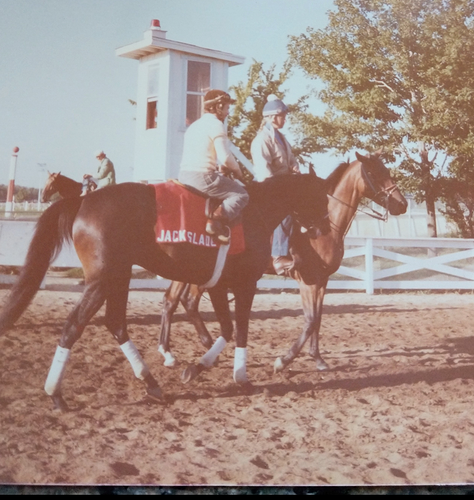


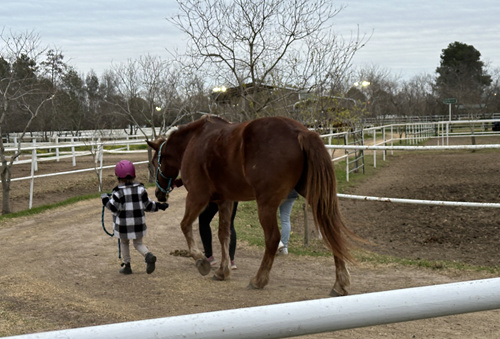
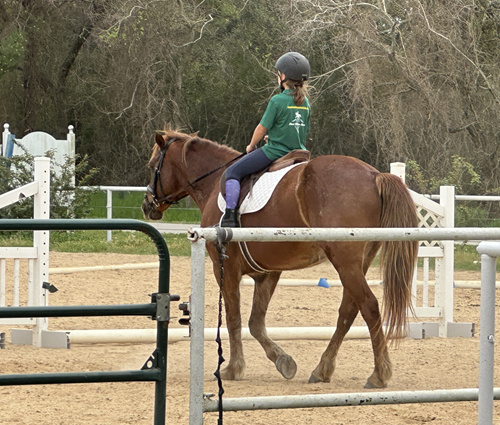
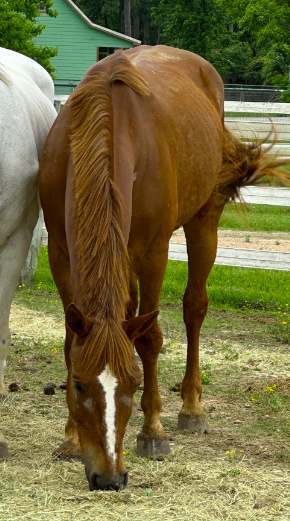
 That’s so good she’s unfazed by witchy pony.
That’s so good she’s unfazed by witchy pony.  ) but any side-by-side first day/now updates?
) but any side-by-side first day/now updates?

